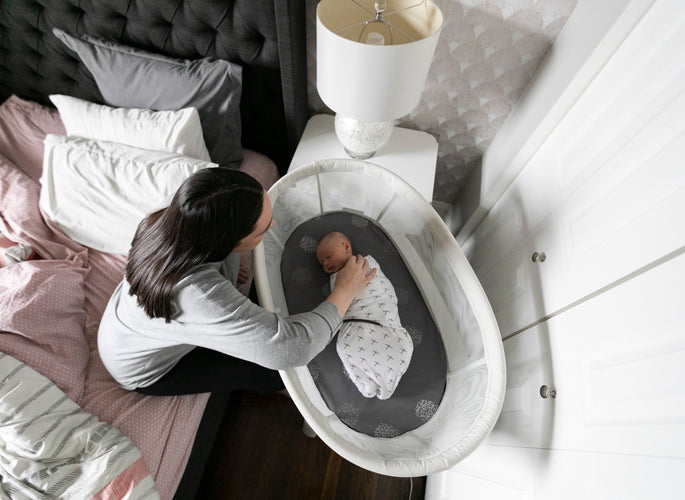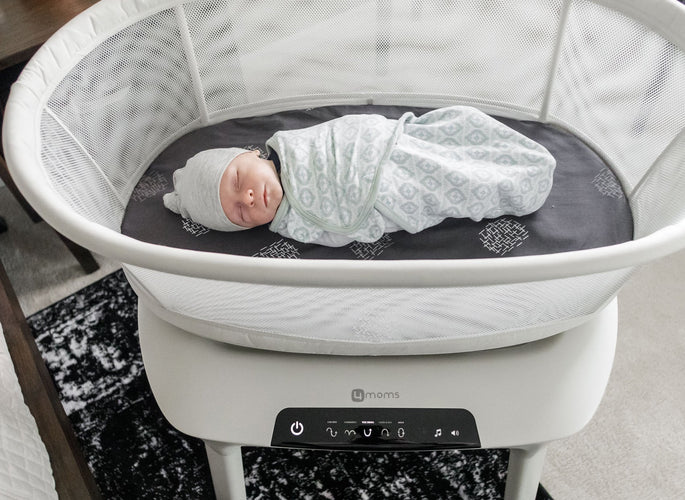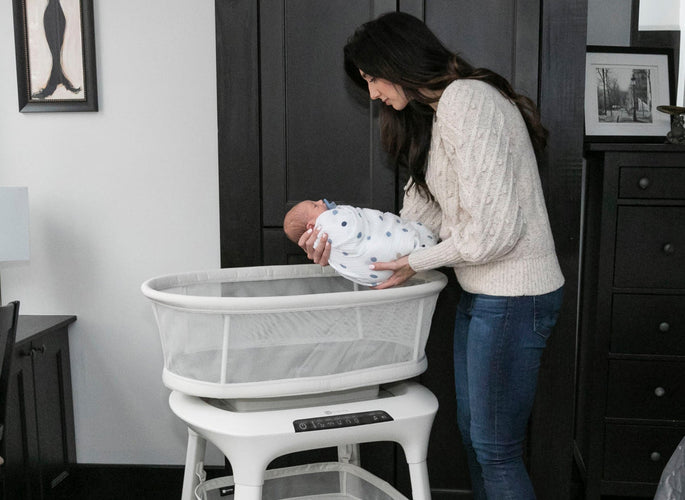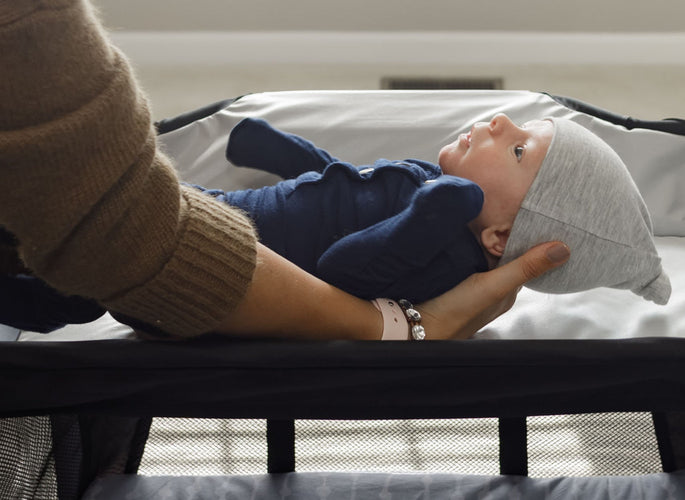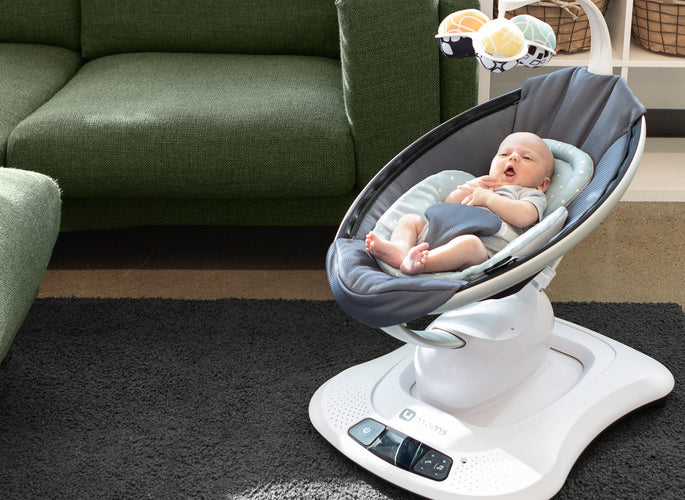← Older Post Newer Post →

Understanding Your Newborn’s Sleep Needs
By Carolynne J. Harvey, founder of Dream Baby Sleep
Getting a newborn to sleep can be a challenge, since their sleep is so different from ours. But the best offense is a good defense. Knowing as much as you can about your baby’s sleep will help stave off any bumps in the road.
Your baby’s sleep will change as she grows. Namely, your baby’s sleep may be affected or interrupted when she’s close to achieving developmental milestones. Here is what you can expect as a new parent:
0-3 months
First, know that newborns sleep a lot…just not all at once. And it’s hard to have much of a schedule because newborns have yet to start producing melatonin, the hormone that regulates sleep.
It’s normal for a newborn to sleep anywhere from 14 to 17 hours a day! But this sleep will be broken down into small fragments - naps can last anywhere from 20 minutes to 2 hours, and night sleep stretches are typically around 2-3 hours.
Newborns also have tiny stomachs— a one-week-old’s is about the size of an apricot— so they need to wake often to eat, about every 2-3 hours.
The most important thing is offering naps frequently. Aim to put them to sleep after 45-60 minutes of being awake. Sleep leads to more sleep, so good sleep days will mean better sleep nights! I also recommend waking a newborn after a 2-hour nap, so they can eat enough during the day and not get too much daytime sleep.
Sleep will be a little elusive for moms and dads during this time, so have realistic expectations. But laying a good sleep foundation is so important.

3-4 months
Around 12-16 weeks, babies begin to produce their own melatonin, aka the sleep hormone. Melatonin is what cues us to want to go to sleep at night and stay asleep until the morning. Though babies in this age range are starting to make their own, they do not produce a “complete” amount of melatonin in order to sleep through the whole night, so don’t expect that just yet! It often wears off around 3 or 4 a.m., so the early morning hours can be tough. Swaddling, motion and white noise can really help. Make sure the room is super dark, too!
Many parents of 3-4 month olds begin to see very short naps, as babies are just starting to learn to go to sleep independently and may struggle to stay asleep. This is normal! Keep offering naps every 1.5 to 2 hours to prevent overtiredness. Remember, the more they sleep during the day, the better they sleep at night!
The biggest developmental change is many babies begin rolling around this time, which can cause big changes in their sleep, including the dreaded four-month sleep regression. There are many ways to get ahead of these changes and implement proactive routines to lessen the impact on your family’s sleep, like plenty of tummy time during the day. Also keep in mind that if they are rolling it is no longer safe to swaddle them, which may cause them to wake up more often.
4-6 months
This is when many parents report seeing big improvements in their babies’ sleep. Your baby is capable of sleeping longer stretches now, and hopefully you are getting some better rest as well!
Babies can begin to handle being awake for longer, and you can get them on a schedule. From 4-7 months offer 3 naps at 9am, noon and 3pm. Bedtime should be no later than 6:30pm. Always use an early bedtime if you have an off nap day!

Developmentally, babies may be starting solid foods around this time, which can interfere with sleep if they have difficulty digesting what they are eating. Try and introduce new foods earlier in the day so they have more time to digest!
As their melatonin production ramps up, babies may start outgrowing their need for motion around this age. You may find they sleep better without it. You can always adjust the motion on the MamaRoo Sleep Bassinet if you find your baby is ready to wean from the motion in preparation to transition to their crib.
Other Keys for Sleep Success
For sleep success, you want to use the tools in your toolbox to help your baby get their best sleep. The first and most important thing is for your baby to have a safe place to sleep. The AAP recommends room sharing (not bed sharing) until at least 6 months. This can be a crib or a bassinet like the MamaRoo Sleep Bassinet. Make sure that your baby’s sleep space is:
- Firm
- Flat
- Fitted - tightly-fitting bedding and no loose items
For warmth, your baby can wear a swaddle if he or she can’t roll over yet. Transition to a sleep sack if they do start rolling - a wearable blanket is much, much safer than a loose one. And always place baby down on his or her back!
You’ll also want to make the environment conducive to sleep— white noise often helps because it evokes the sounds of the womb, which is relaxing and comforting for infants. (It also covers up exterior sounds, like the dog barking or your TV!) A standalone white noise machine can be a great way to get steady, continuous white noise, or the MamaRoo Sleep Bassinet has the white noise built right in.
Babies also sleep best in dark, cool environments— the ideal temperature is about 68-72 degrees Fahrenheit. And while brand-newborns can often sleep fine in brighter rooms, pitch darkness helps their melatonin develop, especially in those tough early-morning hours, so it’s worth making sure their room is very dark from day one.
Babies also thrive on routine— research has shown that babies as young as three months can rely on patterns to tell them what will happen next. So before each time your baby goes to sleep, whether that’s for nap or bedtime, try and create a consistent routine to help them understand that sleep is coming. It doesn’t have to be long or complicated! Read a quick story, put them in their sleep sack or swaddle, turn on their white noise, turn out the lights and place them down. (You can add a quick song or goodnight phrase in, too!)
If baby is sleeping well, you’re sleeping well, too. Knowing what to expect and setting yourself up for success is the key to a good night sleep for the entire family.

